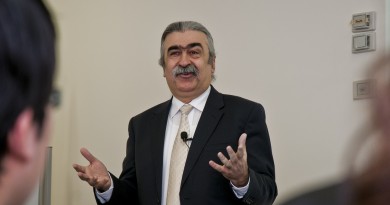USC Geography Professor Developing New Capitals of the World Minor
Dr. Anaya Robinson fondly looks back on the first world capital city she learned as a child. Today, she is proud to turn her passion for memorizing the names of cities into an academic career in geography.
“I was seven years old, I’ll never forget this, and my mother said we were visiting our family abroad. She was like, ‘Anaya, we are visiting your aunt in Ottawa… That’s the capital of Canada.’” Robinson explained. “And I remember being blown away like, ‘Wow, that was a really cool fact to learn.’ Turns out my aunt actually lives in Vancouver, but still, this was a big deal for me.”
This experience sparked her passion for the discipline. For her birthday that year, she received her first atlas, and she credits her familial support as a major factor for her success today.
“My uncle would quiz me, and he’d ask me what the capital of France was, and I’d have this little memory trick where I would think of my French friend asking me what a pear was, and I’d remember, oh, it’s Paris. Like Pear-is.” Robinson explained.
In developing the minor, Robinson says she has become less reliant on the mnemonics, but can offer them as a resource to students who need help.
“These types of memory tricks helped, but I will admit, I didn’t really have a French friend growing up,” Robinson paused for a moment. “Or really any friends.”
The minor will have three major concentrations: American capitals, where students are responsible for learning the capitals of the fifty US states, continental capitals, where students pick a continent of their choosing and learn the capitals of its countries, and creative capitals. The latter concentration culminates in a proposal where Robinson advises students to “imagine what it would be like if there was, like, a new capital, and what that would be like.”
Other departments and programs are taking note of the new course offering and hope to encourage their students to pursue the new geography minor.
International Business Professor Jacob Woltenstein explains that this program would give USC students a competitive edge over other students who hope to work on the international stage.
Woltenstein strongly endorsed the program’s goals, explaining that he “cannot think of a single program at this university that could stop students from thoroughly embarrassing themselves on the international stage better than this minor.”
Emilia Cortez, a third year student in the Global Studies department, has taken some of the prerequisites for the minor, and insists that it has been relevant work for her future career goal as a foreign ambassador for the United Nations.
“The coursework taught me how to say the names of a lot of Asian cities. I know all of the Asian capitals off the top of my head now, even though I didn’t know any of them a week ago.” Cortez then proceeded to recite them from memory over a phone call.
“Afghanistan’s is Kabul, Armenia’s is Yerevan, Azerbaijan’s is Baku, click here for the full list of capitals, oh shit-”
The minor will be available to undergraduate students beginning in Fall 2019.




